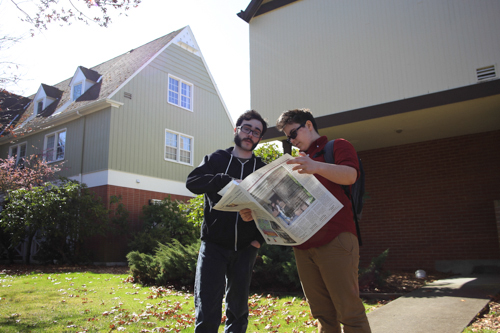Tuition for the academic year is set to increase once again. According to the university’s Budget Task Force (BTF) report, the administration has decided to increase the tuition by 3.75 percent for the 2014-2015 academic year. The tuition for this year was set at $41,640, and the increase will put it at $43,200. The figure may seem hefty upon first glance, but this is in fact the lowest increase in tuition that the university has seen in 42 years.
There is the old saying that one cannot put a price on education, but the rise in tuition is reflective of good intentions.
“71 percent of Puget Sound’s budget goes toward compensation of faculty and staff,” Chief Financial Officer Sherry Mondou said. “The primary reason for the increase in tuition is the increase in compensation for Puget Sound to be competitive in recruiting and retaining an exceptional faculty and staff, which is central to the high quality of education we offer.”
The BTF addresses the issue of “across-the-board” compensation which, according to the report, has “not kept up with inflation [over the past three years].” In this short stretch of time, the US Consumer Price Index (CPI) has increased 6.8 percent, while the Seattle-Tacoma-Bremerton CPI has increased 6.4 percent. To contrast, all University of Puget Sound faculty and staff increases for the same time period was 5.4 and 5 percent, respectively, according to the BTF. With the rise in tuition, the university is looking to increase faculty salary by 4.5 percent, and staff salary by 3.5 percent.
Despite the fact that this is the lowest tuition raise in nearly 50 years, and despite the fact that faculty is receiving well-deserved compensation, some students have shown mixed reactions regarding the tuition increase.
“I don’t think the tuition increase is inherently bad,” junior Ryan Del Rosario said. “I mean, yeah, I am going to pay more money, but I think the benefits—even if we don’t see them now—will make our [sic] way to us. In the end, I see it as worthwhile.”
While those like Del Rosario are confident in the benefits of the rise in tuition, sophomore Noah Blough is slightly more skeptical.
“I don’t think charging the students [for faculty compensation] is productive,” Blough said.
“I think the administration should make cuts from their own salaries. I am also concerned that increasing tuition would not allow for what the school considers increasing diversity.”
The latter statement rests on the concern that increasing tuition could shy away qualified prospective students that come from lower-income families. However, Mondou clarified that the tuition increase could have positive effects for financial aid.
“Depending on a student’s demonstrated financial aid,” she said, “their Puget Sound need-based financial aid could increase modestly if they are in good academic standing.”
Despite the increase, tuition will still rest at a comfortable 4.4 percent below the national peer average, according to the BTF.
An increase in tuition is often necessary to keep up with economic developments on a local and national scale.
True, it may seem daunting to students and their bill-payers to see a higher figure on their statements, but the university must remain competitive with the national average in order to meet standards, and to attract the highest-quality students, faculty and staff for which it is known.



